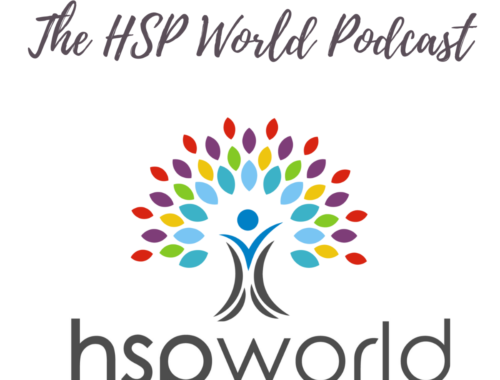
The HSP World Podcast: Episode 1 – What It’s About
Welcome to the first episode of The HSP World Podcast!
It introduces the format of the Podcast and the hosts which is Guest Question, Connection and Conversation.
Thomas: Hello and welcome to the HSP world podcast. I’m Thomas.
Robyn: I’m Robyn.
Rayne: I’m Rayne.
Thomas: So let’s talk about what this podcast is going to be about.
Robyn: Today’s our first episode.
Rayne: Yeah, this is something that kinda came about. Typical HSP, this type of podcast hasn’t been done before. It’s a new creation and what it’s about is an HSP guest coming on and asking an HSP-related question. And then basically we hold space for the guest and have a conversation about what their question is.
Thomas: I really liked this idea of having a conversation, because it feels informal and, it feels safe and it feels interesting.
Rayne: Yes, absolutely and first names only, so they’ll only be introduced by their first name, and then the guest is part of the conversation. The reason why we thought this might be a cool idea to go with is a lot of times HSPs, we are 15 to 20% of the population, and we’re surrounded by non-HSPs the majority of the time. It’s a little bit different right now for some of us because of the safe at home situation, but at the same time, it’s really important that HSPs feel heard and validated. We’re very good at listening, and that’s important. That’s important in our busy world.
So they’ll, they’ll feel heard and validated. They’re going to hear different HSP perspectives that hopefully help them find the best answer for themselves.
Because we’re not therapists. We’re not coaches. We’re not here to give solutions. We are here to have a conversation. That’s what we’re doing. And hold space for the guest and allow natural connection to just take place. And there are no dumb questions.
Thomas: No dumb questions.
Rayne: No dumb questions. And just by asking that question, if you’re an HSP and you have a question, chances are tons of other HSPs have the same question.
We’re all learning about our trait and on our own journeys, everyone’s is different.
Robyn: It’s really interesting that you mentioned that Rayne because, when I’ve been in contexts where, it’s an HSP only conversation, a lot of the times somebody will share an experience and everyone else will kind of look at them and say, Oh I thought it was just me that felt that way, that thought, that, that noticed that, that did that thing. I thought it was just a quirk of mine or maybe that I was a bit, you know, weird or off or something. And then you know, people around the table, and not necessarily everyone, but there’ll be a few people saying, yeah, no, that, that happens to me too.
That’s something I’ve always done or something I’ve always felt. So it can be extremely important when you are in the minority, as you said, to be surrounded by people, who kind of show you that, okay, it’s not, maybe it’s less common, but there’s nothing wrong with thinking like this. And it’s actually kind of useful and helpful and great.
Thomas: And you know how liberating it is to find out, like, it’s not just me, you know? We hear that, Oh, I thought it was just me all the time. And it’s just a great feeling to know that, that it isn’t just me.
Rayne: Absolutely. You’re not alone. 100%. So how about we let them get to know who they’re going to be chatting with.
How about we talk about when we learned we had the HSP trait and what a difference it’s made for us.
Robyn: Sounds great.
Thomas: Yeah, let’s do that. Who wants to start?
Robyn: I can go. So I’ve actually known about the highly sensitive person trait for awhile, at least the way that it’s described by Elaine Aron in her book, the Highly Sensitive Person. I’ve known about that for like seven years or so. But I didn’t really tackle it right away. I didn’t really dedicate energy to finding out more about it or understanding it. And I’ve noticed that can often happen with HSPs. We find out about the trait and we say, Oh yeah, that’s me! And then we kinda drop it to the side for a little bit. Cause it can be a really intense thing to learn about because when you do find out about it, you realize, you know, it affects the way that you interact with the world, the way you, you take in the world and the way that you respond to it. So, you know, that’s, that’s a pretty general thing that affects everything in your life. That affects your day-to-day feelings, your level of stress, your relationships, your career choices, and so on and so forth.
So when you find out about it, it can really do a lot. I jumped into it, more deeply in 2017. I took an online course, and that’s where I started meeting other HSPs who were finding out about their trait. And that was my first experience of connecting with other people who had the trait.
And it was really enriching and energizing and gave me a lot of hope about, you know, things that I could change in my life to make things work better for me. After that, I got involved with a meetup group in my city. There was one that had just been started I think, like two or three weeks before I looked for it.
So it was still pretty new and I was able to get involved in the running of it. And I’ve actually been running it now since mid 2017. So it’s been a really cool way to meet other people who have the similar traits, to see many of the same themes come up again and again, even though each person has their own style of being an HSP.
And it’s a really diverse group. We have people of all ages, as many men as women, all different cultural backgrounds. Like it’s really a, it’s really, really cool to see how we can, you know, have so much diversity, with this one same trait.
And then in terms of how it’s, how it’s affected me, really quite a bit. I was, reflecting with one of my partners who helps me run the group, specifically in the context of a relationship. I’m actually, uh, in a new relationship and I’m with a person who I believe is quite sensitive and it’s really interesting going into a new relationship knowing that, because I respond to the other person differently, I think, than I would have before I knew about this, and I feel better equipped. Not necessarily perfectly equipped, but I feel better equipped to respond to some of the things or at least understand some of the things that, that he might need, whereas it may not have been the case before.
And of course, I know how things are gonna affect me as well. I have a better sense of what am I going to be like in this relationship and what can I offer and what would be more difficult for me to offer? It’s really, really cool to see how, how deep that, that change has gone.
And it’s really, it’s not that anything has happened. It’s just a very deep shift in perspective, and it can still go a really long way.
So that’s my story. More or less. I think we’ll leave it there for now.
Rayne: Thank you.
Thomas: Thank you, Robyn. I’m really intrigued by what you’re saying about how having that knowledge helps you go into a new relationship with a different perspective.
Robyn: Yeah, I mean, and it’s also helped me revisit other relationships as well, right? Uh, other friendships. I do realize that I actually have a lot of sensitive and introverted friends around me. I, myself am not an introvert. I’m an extrovert, but I have a lot of introverted, sensitive friends.
And it’s given me a chance to think about what role that plays in our friendship and as well for my family. A lot of my family members are highly sensitive too, and it’s helped me. I believe that both my parents are, and it’s helped me to understand a little bit, you know, what role that may have played, while we were growing up.
Thomas: Right. Right. Yeah. That’s great.
Well, I’ll go next. I sort of discovered that the trait tangentially. I was researching, I was looking for books on intimacy, as it relates to getting older. And I discovered Elaine’s book, the Highly Sensitive Person in Love.
And it was a revelation to me because it’s like, Oh, okay this explains a lot of the things that I felt when I was growing up as a child, as a kid, and how I related to my family and my parents. Some of the reasons that I’ve may have been very quiet when I was growing up. I discovered the trait around early 2018. And, uh, I joined the large Facebook group, I guess, Highly Sensitive Persons group, and made some connections there and have been really enjoying making those connections ever since.
What else can I say about, about the trait or how’s it affected me? I think I’ve always been very introspective and this has just helped me with some additional perspectives on, you know, looking at myself and how I react to things. And so it’s, it’s helped me understand, how I react to other people, and also How I relate it to creativity. Because I like to think of myself as a tinkerer and a maker, and an artist. So it’s, it’s been, it’s been an interesting journey to discover how my sensitivity relates to creativity and how I come up with ideas and things like that.
Rayne: And I love your playful attitude, that you have for, um, exploring your creativity, Thomas. I find it inspiring.
Thomas: Well, thank you. For me there’s something that the word play means a lot to me. And it’s not just about reconnecting with childhood. There’s, there’s something so fundamental for me about play.
And I believe it has something to do with the fact that we’re mammals and play is how we learn. That’s why, play is, is such an important part of creativity and why I try to incorporate it all the time in everything that I do.
Rayne: Yeah. I love that about you, Thomas.
Robyn: We often hear that that’s one of the really the greatest strengths and gifts of having a high sense level of sensitivity is that it allows you to see things differently. It allows you to see how you can play with things and take them in different directions. And that’s, that’s what’s at the heart of creativity.
Rayne: Absolutely. Absolutely.
Thomas: Rayne, can you say a little bit about how you discovered the trait.
Rayne: Right. Yeah. Okay. So, I ended up finding out by doing a Google search. Sensitive was one of the words I used. And there was another word, I forget what it was.
Anyways, Elaine Aron’s HS person quiz popped up and that was it. And it was super cool at the time because I’d been gathering a bunch of information for quite awhile and it turned out a lot of that information had been signed posts for me for when I learned I had the trait.
That it was like, Oh, well, that’s why I could, you know sense this was happening. Oh, that’s why, you know, I could smell the propane leaking from the tank when no one else could, you know. All these different things, everything just made sense.
So I wasn’t the same way as you Robyn, but I’m also, um, I’m an introvert, but I’m also HSS, which is High Sensation Seeking.
Only 30% of HSPs are like you, Robyn, where they’re extroverts, and only 30% of HSPs are HSS, which is high sensation seeking. So, and that’s what I have. So I dove into the deep end when I found out I had the trait, I just could not learn enough fast enough. I was so, it was just, it was such a relief.
And I just wanted to learn more, learn everything I could about the trait. So, yeah, I started a meetup group in the city I was in and we held the discussion groups, and that’s in a way, in a way, that’s where this idea sort of popped up from because I noticed in the HSP discussion groups that there’s just a certain type of magic that happens when HSPs are conversing with other HSPs.
And I don’t, I don’t know how to really describe it. I haven’t experienced it anywhere else. But there’s just an intrinsic knowing, you know, just there’s, there’s just something about those conversations that are so rich and interesting. And, validating, I guess that’s a big word, validating.
So I just absolutely loved it and my life has just been changing incrementally, as I move forward, as I keep learning and keep incorporating new things into the way I be, the way I, you know, live. I don’t know how else to put it. But simple things like, there’s just like, drinking a pot of coffee is just not an option.
Um, and that it’s okay, and that’s fine, you know? So there’s just so much I’m thankful for. And that I continue to be thankful for the more I learn about this trait and the more I learn how to work with my trait, and the more I talk with other HSPs and connect with other HSPs who are doing the same thing.
I just find my understanding and my learning grows and deepens, and it’s, it’s just a really rich, interesting experience and, uh, and I love it. Yeah.
Robyn: Rayne, could you just mention, kind of generally, what is high sensation seeking?
Rayne: Oh, high sensation seeking. Okay. Well, where someone who has the HSP trait would not take a risk and do something, that might be something that someone who has the HSP trait, but who is also HSS, that might be something they actually do. So in other words, if the benefit is going to outweigh the risk, then that’s something I’ll do.
Robyn: It’s having a higher risk tolerance and like seeking out novelty and stuff like that. I think.
Rayne: Absolutely, absolutely. I love to travel. I love exploring different cultures. I just, I find it amazing to be just surrounded by a completely different culture than what I’m used to. I just, I love all the customs and everything about different cultures. I just, I find it fascinating. Absolutely fascinating. So that’s something that, you know, I know my HSS allows me to do, even though I’m an introvert. I will go somewhere I’ve never been where I don’t know anybody and I will be happy as a clam!
Thomas: Rayne, there’s something that you mentioned, that, uh, that really resonates with me. And, and that’s just that, that sense of ease that you felt once you found out about the trait. Right. Everything feels just a little bit easier, you know, just, just knowing it.
Rayne: Absolutely.
Thomas: Do you get that too, Robyn?
Robyn: Yeah. I guess I would say it helps me tell a different story about things that are going on for me.
Actually something I, I didn’t mention before, but the reason that I went back to do a deeper dive into the trait or information about it, was because at some point I really had this persistent feeling of being different and not really belonging in a lot of circles. And I just couldn’t figure out why.
You know, I’m very sociable. I love being around people. And so I just kept having this feeling like, why, what is it that, that is different here. And I think being able to, now obviously like high sensitivity is one, one trait among many others. It doesn’t explain everything, but it did help me to see where it was playing a role in my life and where it could explain a difference.
And that makes it easier too, because then you just make different attributions for things, right? So like, instead of coming home after a long week and saying like, oh, you know, I’m so tired, and I see some of my friends are still going out and doing something or they’ve got all these projects going on and me on the weekends, I just, ugh, I’m just so tired, you know?
Instead of feeling that there’s something wrong with me now, I would say, okay, I know it is related to the sensitivity. I know I’ve been taking things in more deeply all week, so that, that explains the fatigue. That explains why I’m lower energy now, and you know anything that I maybe decide to take on as a, as a new habit or a new project or whatever, I try to connect it back to that and say, okay, how is this, how, how is my sensitivity going to play a role here?
And that’s where things do become easier. So for example, I know, like changes and transitions and stuff like that, are always stressful for me. Even good ones, there’s always a certain level of stress, um, because I have to acclimatize to a new routine and, and let go of the other ones.
Knowing that in advance does actually make the transition stress easier. Because when it happens, I don’t, I don’t wonder why anymore. I’m like, Oh, no, I know. I know why this is happening. And I can also sometimes do things to reduce the stress. Right. I might take on less commitments or something to compensate.
Rayne: Okay. Um, so, I was just gonna say that I hope this gives the listeners a good feel for who’s going to be holding space with them. And, again, this podcast is about posing a question and we’re here to hold space and have a conversation around that, and for there to be space for the connection to be made. So again, there are no dumb questions.
Thomas: I think it’s going to be a lot of fun.
Rayne: I think it’s going to be a lot of fun. Yeah. There’s no dumb questions. And we’re, we’re all in this together.
Thomas: I’m really looking forward to the discovery too. You know, there’s a, there’s an element of discovery here as, as we have our conversation.
Rayne: Absolutely. Absolutely.
Robyn: I would just encourage any HSPs who feel interested in having a conversation, and you know, sharing a little bit of their questions and or experiences, you know, don’t hold back.
Sometimes we think, Oh, okay. You know, is this, is this really interesting or not? But again, as you said, Rayne, like, chances are very good that if you are feeling this and you see that this, can you link it to your sensitivity? Or even if you’re not sure and you want to explore how it could be. There’s a lot of good that can, that can come from sharing it with other people, who are sitting at home wondering the same thing as you.
And this can be, and if you’ve just found out about your, your trait, just put the name on your trait. That’s a good time. If you’ve known about it for years, that’s an equally good time. You know, it’s, it’s such a rich facet of our lives that, you know, there are many things to explore and discover it at all different points.
Rayne: Yeah. Well put, well put and again, first names only, we’ll only be introducing the guests with their first name. So you, you have a degree of anonymity there, just so you know.
So we’re going to be posting the HSP World a guest podcast call out. We’re going to be posting those on Facebook, Twitter, and Instagram. And if you are interested, there’ll be instructions on the post about how you can put your hand up and say, yeah, you’d be interested.
We’d love to meet you and love to have you on.
If you’re an HSP, have a burning HSP-related question and would like to be a Guest please info@hsp.world.
To listen to the next episode: Are HSPs More Slow To Open Up and Show Their Sensitive Side?
Music credit: Intro and Outro music from the YouTube Music Library. Song is Clover 3.





